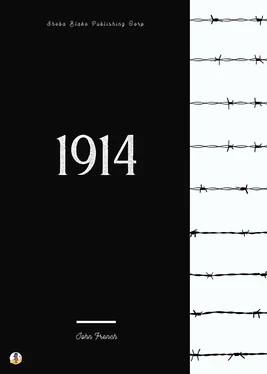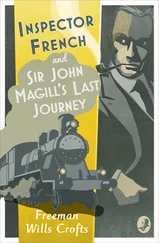John French - 1914
Здесь есть возможность читать онлайн «John French - 1914» — ознакомительный отрывок электронной книги совершенно бесплатно, а после прочтения отрывка купить полную версию. В некоторых случаях можно слушать аудио, скачать через торрент в формате fb2 и присутствует краткое содержание. Жанр: unrecognised, на английском языке. Описание произведения, (предисловие) а так же отзывы посетителей доступны на портале библиотеки ЛибКат.
- Название:1914
- Автор:
- Жанр:
- Год:неизвестен
- ISBN:нет данных
- Рейтинг книги:3 / 5. Голосов: 1
-
Избранное:Добавить в избранное
- Отзывы:
-
Ваша оценка:
- 60
- 1
- 2
- 3
- 4
- 5
1914: краткое содержание, описание и аннотация
Предлагаем к чтению аннотацию, описание, краткое содержание или предисловие (зависит от того, что написал сам автор книги «1914»). Если вы не нашли необходимую информацию о книге — напишите в комментариях, мы постараемся отыскать её.
1914 — читать онлайн ознакомительный отрывок
Ниже представлен текст книги, разбитый по страницам. Система сохранения места последней прочитанной страницы, позволяет с удобством читать онлайн бесплатно книгу «1914», без необходимости каждый раз заново искать на чём Вы остановились. Поставьте закладку, и сможете в любой момент перейти на страницу, на которой закончили чтение.
Интервал:
Закладка:
This was our first practical experience in the use of aircraft for reconnaissance purposes. It cannot be said that in these early days of the fighting the cavalry entirely abandoned that rôle . On the contrary, they furnished me with much useful information.
The number of our aeroplanes was then limited, and their powers of observation were not so developed or so accurate as they afterwards became. Nevertheless, they kept close touch with the enemy, and their reports proved of the greatest value.
Whilst at this time, as I have said, aircraft did not altogether replace cavalry as regards the gaining and collection of information, yet, by working together as they did, the two arms gained much more accurate and voluminous knowledge of the situation. It was, indeed, the timely warning they gave which chiefly enabled me to make speedy dispositions to avert danger and disaster.
There can be no doubt indeed that, even then, the presence and co-operation of aircraft saved the very frequent use of small cavalry patrols and detached supports. This enabled the latter arm to save horseflesh and concentrate their power more on actual combat and fighting, and to this is greatly due the marked success which attended the operations of the cavalry during the Battle of Mons and the subsequent retreat.
At the time I am writing, however, it would appear that the duty of collecting information and maintaining touch with an enemy in the field will in future fall entirely upon the air service, which will set the cavalry free for different but equally important work.
I had daily consultations with Sir William Robertson, the Quartermaster-General. He expressed himself as well satisfied with the condition of the transport, both horse and mechanical, although he said the civilian drivers were giving a little trouble at first. Munitions and supplies were well provided for, and there were at least 1,000 rounds per gun and 800 rounds per rifle. We also discussed the arrangements for the evacuation of wounded.
The immediate despatch from home of the 4th Division was now decided upon and had commenced, and I received sanction to form a 19th Brigade of Infantry from the Line of Communication battalions.
At this time I received some interesting reports as to the work of the French cavalry in Belgium. Their morale was high and they were very efficient. They were opposed by two divisions of German cavalry whose patrols, they said, showed great want of dash and initiative, and were not well supported. They formed the opinion that the German horse did not care about trying conclusions mounted, but endeavoured to draw the French under the fire of artillery and jäger battalions, the last-named always accompanying a German Cavalry Division.
At 5.30 a.m. on the 21st I received a visit from General de Morionville, Chief of the Staff to His Majesty the King of the Belgians, who, with a small staff, was proceeding to Joffre’s Headquarters. The General showed signs of the terrible ordeal through which he and his gallant army had passed since the enemy had so grossly violated Belgian territory. He confirmed all the reports we had received concerning the situation generally, and added that the unsupported condition of the Belgian Army rendered their position very precarious, and that the King had, therefore, determined to effect a retirement on Antwerp, where they would be prepared to attack the flank of the enemy’s columns as they advanced. He told me he hoped to arrive at a complete understanding with the French Commander-in-Chief.
On this day, August 21st, the Belgians evacuated Brussels and were retiring on Antwerp, and I received the following message from the Government:—
“The Belgian Government desire to assure the British and French Governments of the unreserved support of the Belgian Army on the left flank of the Allied Armies with the whole of its troops and all available resources, wherever their line of communications with the base at Antwerp, where all their ammunition and food supplies are kept, is not in danger of being severed by large hostile forces.
“Within the above-mentioned limits the Allied Armies may continue to rely on the co-operation of the Belgian troops.
“Since the commencement of hostilities the Field Army has been holding the line Tirlemont—Jodoigne—Hammemille—Louvain, where, up to the 18th August, it has been standing by, hoping for the active co-operation of the Allied Army.
“On August 18th it was decided that the Belgian Army, consisting of 50,000 Infantry rifles, 276 guns, and 4,100 Cavalry should retreat on the Dyle. This step was taken owing to the fact that the support of the Allies had not yet been effective, and, moreover, that the Belgian forces were menaced by three Army Corps and three Cavalry Divisions (the greater part of the First Army of the Meuse), who threatened to cut their communications with their base.
“The rearguard of the 1st Division of the Army having been forced to retire after a fierce engagement lasting five or six hours on August 18th, and the Commander of the Division having stated that his troops were not in a fit state to withstand a long engagement owing to the loss of officers and the weariness of the men; and, moreover, as the Commander of the 3rd Division of the Army, which was so sorely tried at Liége, had similarly come to the conclusion, on August 19th, that the defence of the Dyle was becoming very dangerous, more especially in view of the turning movement of the 2nd Army Corps and 2nd Cavalry Division, it was definitely decided to retreat under the protection of the forts at Antwerp.
“The general idea is now that the Field Army, in part or as a whole, should issue from Antwerp as soon as circumstances seem to favour such a movement.
“In this event, the Army will try to co-operate in its movements with the Allies as circumstances may dictate.”
Exhaustive reconnaissances and intelligence reports admitted of no doubt that the enemy was taking the fullest advantage of his violation of Belgian territory, and that he was protected to the right of his advance, at least as far west as Soignies and Nivelles, whence he was moving direct upon the British and 5th French Armies.
In further proof that, at this time, no idea of retreat was in the minds of the leaders of the Allied Armies, I received late on Friday, the 21st, General Lanrezac’s orders to his troops. All his corps were in position south of the Sambre, and he was only waiting the development of a move by the 3rd and 4th French Armies from the line Mézières—Longwy to begin his own advance.
As regards our own troops, on the evening of the 21st, the cavalry, under Allenby, were holding the line of the Condé Canal with four brigades. Two brigades of horse artillery were in reserve at Harmignies. The 5th Cavalry Brigade, under Chetwode, composed of the Scots Greys, 12th Lancers, and 20th Hussars, were at Binche, in touch with the French.
Reconnoitring squadrons and patrols were pushed out towards Soignies and Nivelles.
I visited Allenby’s Headquarters in the afternoon of the 21st, and discussed the situation with him. I told him on no account to commit the cavalry to any engagement of importance, but to draw off towards our left flank when pressed by the enemy’s columns, and there remain in readiness for action and reconnoitring well to the left.
The 1st Army Corps, under Sir Douglas Haig, was in cantonments to the north of Maubeuge, between that place and Givry. The 2nd Corps, under Sir Horace Smith-Dorrien, was to the north-west of Maubeuge, between that place and Sars-la-Bruyère. The 19th Infantry Brigade was concentrating at Valenciennes.
Turning to our Ally, the 6th and 7th French Reserve Divisions were entrenching themselves on a line running from Dunkirk, through Cambrai and La Capelle, to Hirson. The 5th French Army was on our right, the 18th French Corps being in immediate touch with the British Army. Three Divisions of French cavalry under General Sordet, which had been operating in support of the Belgians, were falling back behind the 18th Corps for rest and refit. The 3rd and 4th French Armies, comprising 8-1/2 Corps, three Cavalry Divisions and some reserve Divisions, were between Mézières and Longwy. The French troops further south had taken the offensive and marched into Alsace. Liége still held out. Namur was intact. The Belgians seemed secure behind the fortifications of Antwerp.
Читать дальшеИнтервал:
Закладка:
Похожие книги на «1914»
Представляем Вашему вниманию похожие книги на «1914» списком для выбора. Мы отобрали схожую по названию и смыслу литературу в надежде предоставить читателям больше вариантов отыскать новые, интересные, ещё непрочитанные произведения.
Обсуждение, отзывы о книге «1914» и просто собственные мнения читателей. Оставьте ваши комментарии, напишите, что Вы думаете о произведении, его смысле или главных героях. Укажите что конкретно понравилось, а что нет, и почему Вы так считаете.












